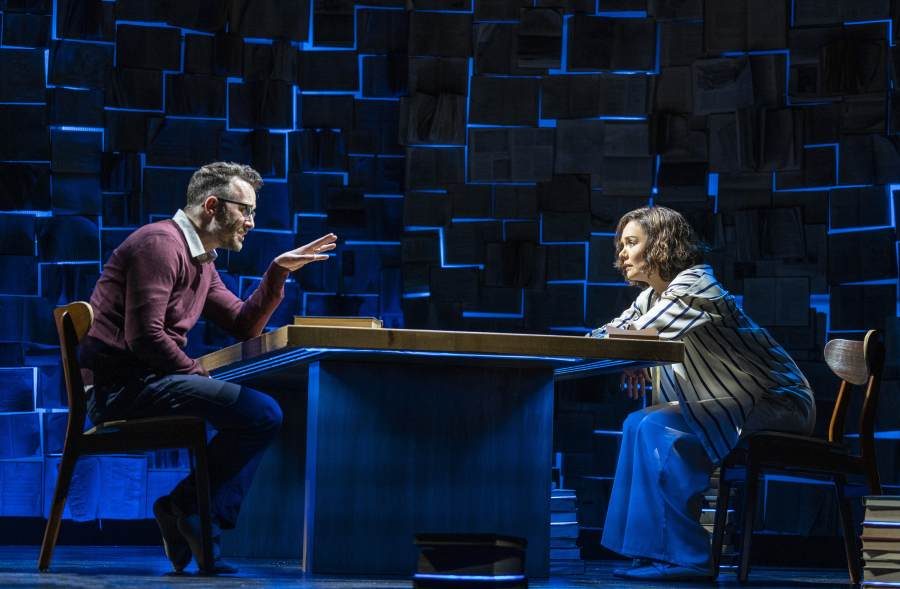

photo by Joan Marcus
Historically, the Jewish people have been wanderers, always in search of a homeland. They moved from place to place seeking somewhere to put down roots. Never totally welcomed, often barely tolerated until they were chased out. Anna Ziegler’s new play “The Wanderers” features two couples, one from the 1970’s and the other from 2010’s, who are emotionally and culturally wandering. They are questioning their beliefs and relationships.
The first couple is Orthodox and has entered into an arranged marriage, Esther (nicely portrayed by Lucy Freyer) and her new husband Schmuli (Dave Klasko.) Esther is playful, adventurous and chatty. In contrast, Schmuli is compliant and timid, afraid of his father. Esther’s exuberance delights the audience which roots for her. Although Schmuli loves his wife, he’s so tied to his religion that later he’d rather lose her than go against his father.
The second couple appears in the present day. Abe (Eddie Kay Thomas) is a young prize-winning writer who gives a reading of his work that is attended by Julia Cheever, a famous actress. Cheever ( a wooden Katie Holmes) emails him and the two begin an online correspondence. He is so obsessed with Julia that he keeps the relationship secret from his wife Sophie. Abe reveals things online to Julia that he’s never shared with anyone. Their relationship is far-fetched and although it leads to a big revelation at the end, it feels like a weak theatrical device.
Sophie (excellent Sarah Cooper) is having her own misgivings about the way her life is going. Should she return to writing? Should she have a third child? Although only culturally Jewish ( the product of a Jewish mother and a Black father,) should she send their children to Hebrew school?
Abe is conflicted about his marriage, Sophie about her career, Esther about her life as a Jewish woman. Ironically, the only one who seems to have no doubts about his life is Schmuli. Yet at the end, he’s unhappy until his son ‘rewrites’ his narrative.
Ziegler sprinkles the dialogue with several Hebrew phrases, which are often mispronounced and feel gratuitous.
One might view this play through a feminist lens and examine the attitude towards women and the depiction of the men. Schmuli is weak and Abe is overbearing and self-centered. Although Thomas works hard and becomes emotional with tears in his eyes, it’s hard to feel sympathetic towards his character. Even when Sophie offers to listen to her husband, he turns her away, preferring to share with the ‘fantasy woman” on the screen.
The play questions the idea of happiness, asking “can we be happy with what we have while we have it?” For both husbands, they only appreciate their wives after they’ve lost them. Both wives seek more than their marriages are providing for them.
The couples alternate stage time, never spending time together on stage. Directed by Barry Edelstein, the staging is minimal. One long wooden table sits at the center of the stage. Sometimes it is moved slightly but little else changes onstage. Marion Williams’s stage design of open books is marvelous.
Once the audience can get past some of the didactic dialogue, they might feel some recognition.The two couples mirror the struggles of couples and individuals. Although they are Jewish, their struggles are universal.
Harold and Miriam Steinberg Center for Theatre
Laura Pels Theatre
111 West 46th Street
(between 6th and 7th Avenues)